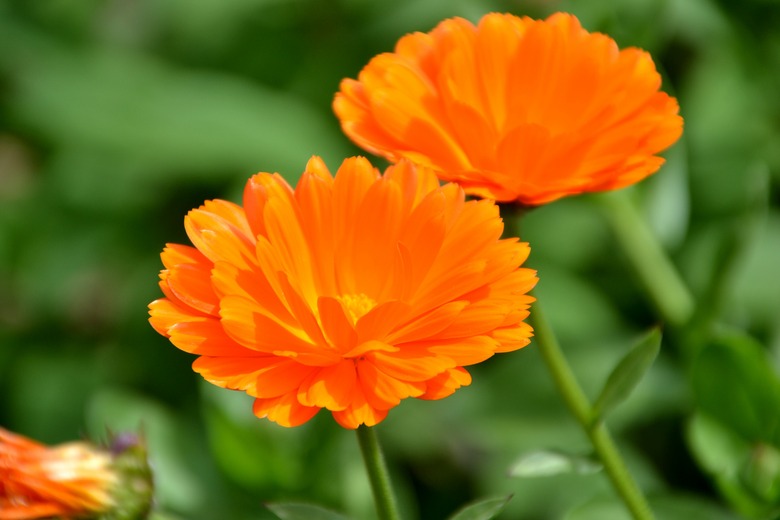Are Marigolds Poisonous To Dogs & Cats?
Did you know that one variety of the glorious, multi-faceted marigold is fed to chickens to brighten the yellow of their egg yolks? That's how intensely color-saturated marigold flower heads are, and they're a clear favorite of veteran gardeners for the spectacular color they infuse into the garden along with their no-fuss maintenance. Although these days the bold marigold has taken a back seat to several exotic new plant kids on the block, this old-fashioned garden stalwart still has millions of fans.
And if you're a marigold enthusiast as well as a pet parent, you'll want to know whether these humble beauties are toxic to cats and dogs before planting them. The good news is that one species of marigold, Calendula officinalis, also commonly known as a pot marigold is considered non-toxic. The bad news is that other marigold species, Tagetes or French marigolds are toxic to pets causing mild gastric upset and more serious effects if a large amount was consumed, and should be avoided if pets frequent your garden area. Knowing which ones are which is the first step to keeping your garden safe for your dogs and cats.
Choose non-toxic pot marigolds
Choose non-toxic pot marigolds
If you love marigolds and have pets, consider growing the pot marigold—the pretty, non-toxic member of the marigold family. In fact, the flowers of the pot marigold are quite the opposite — they're edible (for humans) raw or blanched, fresh or dry, sweet or savory and can be found garnishing salads and gourmet dishes in the finest restaurants. When shopping for a pot marigold, keep in mind this plant is also known as the calendula, ruddles, Mary bud, gold bloom, common marigold, or Scotch marigold. "Tangerine Gem," "Lemon Gem" and "Red Gem" are a few others that are edible. These marigolds are a wonderful choice for the flower garden in a backyard or other area that your dogs or cats frequent.
Low-maintenance with profuse blooms all summer long, pot marigolds produce large flowers in warm hues of yellow, red, and orange and are only intolerant of intense heat and long periods of hot, humid weather. These are flowers that enhance your garden with rich color, are easy to keep, and are animal-friendly. What's not to love?
As VCA Hospitals explains, "Calendula (Calendula officinalis), or pot marigold, is very commonly used in herbal medicine as a topical anti-inflammatory and antiseptic. Its soothing effect is due to its ability to scavenge free radicals (which are products of inflammation), preventing them from causing further inflammation, and to its ability to inhibit lymphocyte proliferation (a white blood cell associated with the immune system)." Indeed, calendula is medicinally beneficial as well as a beautiful plant for your pet-centric garden!
Identifying toxic French marigolds
Identifying toxic French marigolds
Marvellous ornamental flowers, compact and bushy French marigolds have been cultivated for ages. Easy to grow and care for, they are a go-to for savvy gardeners. But if you have pets, be aware they can cause gastric upset if ingested and dermal irritations when skin is exposed to the plants' sap.
Native to the Americas, tagetes patula or French marigolds are members of the daisy family. Sturdy annuals, French marigolds typically grow 6- to12-inches tall and feature single, semi-double, double, or crested flowers that are 1- to 2-inches in diameter. The flower heads are yellow, orange, red, a unique bronze color, or bicolor. The aromatic, pinnate leaves are toothed and arranged like that of a feather with lance-shaped leaflets on each side of a common axis.
Symptoms of marigold poisoning in dogs and cats
Symptoms of marigold poisoning in dogs and cats
If you suspect your cat or dog has had skin exposure to the sap of the marigold or ingested any of the plant, which may be evident as some plant matter may be present around their mouth, watch for the following symptoms and seek veterinary consultation or professional advice from an animal poison helpline:
- Vomiting
- Drooling
- Diarrhea
- Stomach pain.
- Irritation around the eyes, nose, and mouth.
- Redness of the skin.
- Irritation of mucous membranes.
What to do if your pet eats French marigolds
What to do if your pet eats French marigolds
There's a lengthy list of flowers and plants that are toxic to cats and dogs; among them the striking hydrangea, lily of the valley, daffodil, azalea, tulip, hyacinth, and several others that long-time gardeners may be surprised to learn are poisonous. A full list of toxic and non-toxic plants is available at the American Society for the Prevention of Cruelty to Animal's website, which is a good place to start when planning your gardens to be pet-safe.
In contrast to some of the more severe effects of some plants' toxicity, marigolds, specifically plants of the tagetes species, cause only mild irritation to the gastrointestinal tract when ingested by cats or dogs, states the Pet Poison Helpline. Also, dogs and cats may develop a skin rash if exposed to the sap of marigold plants and flowers. While compared to some of the most severe adverse reactions to a number of toxic plants, marigold toxicity is considered relatively mild, it is a cause for concern. Depending on the amount ingested and the pet's health condition, age, immune system status, there could be a more severe reaction than the typical mild one.
It's always prudent to seek advice from one of the animal poison centers, contact your veterinarian, or go to the veterinary emergency clinic where they can properly assess and treat your beloved pet.
Resources to have on hand
Resources to have on hand
Be proactive, and always be prepared for a pet poisoning emergency by keeping your veterinarian's phone number programmed on your phone, as well, the phone number of the nearest emergency vet clinic, the 24/7 ASPCA Poison Control Center (888) 426-4435 (a consult fee may apply), and the Pet Poison Helpline's number 855-764-7661. Pet Poison Helpline is a 24/7 independent, nationally recognized, triple-licensed animal poison control center available to pet parents in the United States, Canada, and the Caribbean (a $59 fee applies to each incident).
Of course, prevention is always the best choice, and when it comes to toxic plants and pets coexisting, why take a chance — an array of gorgeous, completely non-toxic flowers and plants are readily available, or simply plant pot marigolds.
Conclusion
Conclusion
When you're a pet parent, all marigolds are not created equal. If you're shopping for that sunrise/sunset-hued pop for your garden, learn to identify the different kinds of marigolds and know the different names that toxic marigolds may be labelled by in different stores or nurseries so you can avoid them. And if your pet comes into contact with or ingests a toxic marigold when visiting family or friends or in a public park seek veterinary consultation.
And if marigolds are a must for your garden, do consider all the great characteristics of pot marigolds. Most importantly, they are non-toxic to your dogs and cats. Their lively, long-lived blooms, virtually maintenance-free care, insect-repelling attributes (due to their rather unpleasant scent), and affordability, too, make pot marigolds worth their weight in gold to beginner gardeners and pros alike.
Bottom-line, if you're a pet parent and marigolds tickle your fancy, there's no need to leave them out of your garden— you can have your pot marigolds, and eat them, too.
Always check with your veterinarian before changing your pet's diet, medication, or physical activity routines. This information is not a substitute for a vet's opinion.
References
- Pet Poison Helpline: Marigold
- Gardener's Path: Grow Marigolds
- Trib Live: In Praise of the Marigold
- Pet Poison Helpline: Emergency Instructions
- Fine Gardening: Pot Marigold
- ASPCA: Toxic and Non-Toxic Plants
- The Atlantic: They're What's for Dinner
- ASPCA: Animal Poison Control Center
- Wag Walking: Marigold Poison
- Pet Net: Healthy Ingredients for Your Pet – Marigolds
- Good Housekeeping: How to Grow French Marigolds



